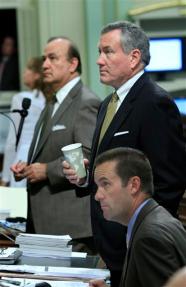
Assemblyman Steve Knight, R-Antelope Valley, seated, Assembly Minority Leader Martin Garrick, R-Solana Beach, and Assemblyman Charles Calderon, D-Montebello, watch as the votes are posted for the state budget bill at the Capitol in Sacramento, Calif., Thursday, Oct. 7, 2010. By a 54-1 vote the Assembly passed the main bill in a legislative package aimed at ending California's record budget impasse and closing a $19 billion deficit. The measure was sent to the Senate for final approval. (AP Photo/Rich Pedroncelli)
California entered its record 100th day without a budget Friday as state lawmakers worked through the night without reaching final agreement on a plan to close a $19 billion budget deficit.
The state Senate struggled to pass the main bill in a legislative package aimed at ending the budget impasse. The Assembly voted Thursday in favor of the measure, SB870, getting just enough support in the 80-member house to reach the required two-thirds vote threshold.
Both chambers remained in session as they tried to complete their work.
California has been without a budget since July 1. The record delay has left the state on the brink of issuing IOUs and cutting off funding for road projects.
Senate President Pro Tem Darrell Steinberg of Sacramento remained optimistic as he conferred before dawn with his fellow Democrat, Assembly Speaker John Perez of Los Angeles.
"It's challenging," Steinberg said.
Aside from the main budget bill, legislators were stalled on approving pension reforms demanded by Gov. Arnold Schwarzenegger as a condition for signing the budget.
Legislative leaders and most of the state's public employee unions had agreed to pension reforms that included higher retirement ages for state employees hired after Nov. 10 and higher contribution rates for all state workers. However, a bill to enact the changes into state law repeatedly fell short of the two-thirds vote needed for passage.
The state's ability to meet its financial obligations was a mounting concern.
The impasse continued hours before state Controller John Chiang was to announce whether California will need to issue IOUs for lack of cash.
The state needs a signed budget in order to start borrowing money to bridge the cash shortage that is typical each fall before the springtime influx of tax revenue, said Joe DeAnda, a spokesman for the state treasurer's office.
The late budget also is making it more difficult for the state to issue long-term bonds to support $7 billion worth of public works projects this fall, he said.
Schwarzenegger and Republican and Democratic leaders of the Assembly and Senate announced a week ago that they had a budget agreement. But leaders have been unable to line up the necessary vote, putting the package in jeopardy.
Even if it passes, legislators admitted that it is built largely on a shaky financial foundation that may push the state's financial problems past next month's election.
The agreed package contains no new taxes or fees, and just 40 percent of the gaping deficit would be closed by additional spending cuts. The rest would be addressed through rosy revenue assumptions and creative accounting.
The plan also counts on the state receiving $5.3 billion from the federal government, far more than it has received so far.
In addition, it assumes a statewide economic recovery that will generate an additional $1.4 billion in tax revenue.
If those assumptions fall short, the difference will be added to the budget deficit that will greet Schwarzenegger's successor in January.
Also under the deal, nearly $2 billion in payments to K-12 schools and California's community colleges would be delayed until the next fiscal year.
If approved, the budget would allow Schwarzenegger to claim victory in two of the three areas of reform he demanded as a condition of signing a spending plan.
Legislative leaders also agreed to ask voters in 2012 to approve a larger rainy day fund to build a cash reserve for future economic downturns. They increased the maximum size of the fund from 5 percent to 10 percent of general fund revenue.
The budget plan does not include the tax changes sought by the Republican governor, including recommendations released last year by a commission created by the governor and Democratic leaders. Schwarzenegger spokesman Aaron McLear said the governor will keep pushing for tax changes he believes are needed to solve California's long-term budget imbalances.
The national recession has forced lawmakers and the governor to make tens of billions of dollars in spending cuts in the past two years as state tax revenue plummeted. This year's $19 billion deficit amounts to more than 20 percent of the state's $87.5 billion general fund, which was as high as $103 billion as recently as the 2007-08 fiscal year.











